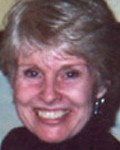
Areas of Interest: Rhetoric & Composition and Writing in the Professions
Contact Information
Email: mccarthy@umbc.edu
Office: PAHB 402
Office Number: 410-455-3923
Education
Ph.D., University of Pennsylvania
M.A., University of Chicago
B.A., Stanford University
Biography
Lucille McCarthy, Professor of English, began teaching at UMBC in 1988. Since that time, her primary passion has been and remains classroom teaching, more specifically her commitment to explore with students the nature of effective writing and provocative and socially aware literature. This same passion for teaching lies behind her long career as a researcher.
At the center of her many articles and books is her desire to know more about the pedagogies that best promote student learning and writing. Five of her six books and many of her articles focus on student classroom experiences and have won her recognition from her colleagues. This recognition includes two James N. Britton Awards for Research in the English Language Arts, the first in 1993 for a study of writing in the academic disciplines and the second in 2000 for her book John Dewey and the Challenge of Classroom Practice (coauthored with philosopher Stephen Fishman).
Professor McCarthy’s latest book is John Dewey and the Philosophy and Practice of Hope, co-authored with Stephen M. Fishman (University of Illinois Press, 2007). This book is an interdisciplinary study of philosophic and psychologic theories of hope and the ways these theories are put into practice in the lives of undergraduates. Her Whose Goals? Whose Aspirations? (2002) explores the struggles of “underprepared” student writers at the university level and the teaching approaches that helped them. In addition to studying writing in academic settings, Professor McCarthy has conducted research in medical settings. For her work in this area, she won an NCTE award for Research Excellence in Technical and Scientific Communication in 1995.
Representative Publications
- “Revising Psychiatry’s Charter Document: DSM-IV,” with Joan Gerring, M.D. Written Communication 11 (1994): 147-192.
- “A Stranger in Strange Lands: A College Student Writing Across the Curriculum.” Research in the Teaching of English 21 (1987): 233-65.
- “Boundary Conversations: Conflicting Ways of Knowing in Philosophy and Interdisciplinary Research,” with Stephen M. Fishman. Research in the Teaching of English 25 (1991): 419-68.
- “Teaching for Student Change: A Deweyan Alternative to Radical Pedagogy,” with Stephen M. Fishman. College Composition and Communication 47 (1996): 342-66.
- “Talk About Race: When Student Stories and Multicultural Curricula Are Not Enough,” with Stephen M. Fishman. Race Ethnicity and Education 8.4 (2005): 347-364.
- “Community in the Expressivist Classroom: Juggling Liberal and Communitarian Visions,” with Stephen M. Fishman. College English 57 (1995): 62-81.
- “Looking to Dewey and Freire for Hope in Dark Times,” with Stephen M. Fishman. Educational Practice and Theory 27.1 (2005): 25-48.
- “The Morality and Politics of Hope: John Dewey and Positive Psychology in Dialogue,” with Stephen M. Fishman. Transactions of the Charles S. Peirce Society XLI.3 (2005): 675-701.
Books
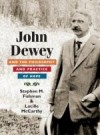 John Dewey and the Philosophy and Practice of Hope
John Dewey and the Philosophy and Practice of Hope
University of Illinois Press, 2007
John Dewey and the Philosophy and Practice of Hope combines philosophical theory with a study of its effects in an actual classroom. Lucille McCarthy observes Fishman’s undergraduate students reading the theorists. Illustrating students’ own vital engagement with the hope literature, McCarthy reveals how the discussions deepen student understandings.
d
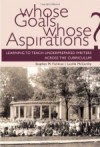 Whose Goals? Whose Aspirations? Learning to Teach Underprepared Writers Across the Curriculum
Whose Goals? Whose Aspirations? Learning to Teach Underprepared Writers Across the Curriculum
Utah State University Press, 2002
Ever since Horace Mann promoted state supported schooling in the 1850s, the aims of U.S. public education have been the subject of heated national debate. Whose Goals? Whose Aspirations? joins this debate by exploring clashing educational aims in a discipline-based university classroom and the consequences of these clashes for “underprepared” writers.
d
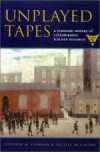 Unplayed Tapes: A Personal History of Collaborative Teacher Research
Unplayed Tapes: A Personal History of Collaborative Teacher Research
National Council of Teachers of English, 2000
This important book focuses on the issues surrounding teacher research over the past twenty-five years. The authors explore these debates, first, by analyzing published accounts of teacher research, both practical and theoretical, and second, by reflecting on their own experience with classroom inquiry.
d
D
d
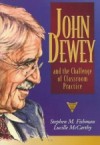 John Dewey and the Challenge of Classroom Practice
John Dewey and the Challenge of Classroom Practice
Teachers College Press/National Council of Teachers of English, 1998
This is an exploration of Deweyan pedagogy in an actual classroom since studies of Dewey’s Laboratory School began at the turn of the century. The authors discuss his educational theory in the context of his ideology and philosophy, and they examine his own Introduction to Philosophy class.
D
D
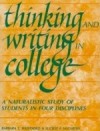 Thinking and Writing in College: A Naturalistic Study of Students in Four Disciplines
Thinking and Writing in College: A Naturalistic Study of Students in Four Disciplines
National Council of Teachers of English, 1991
By examining their teaching methods and the students’ strategies in rigorous detail, the authors provide new and invaluable insights into how college professors in four disciplines teach and how and what their students learn.
d
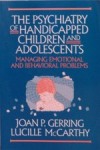 The Psychiatry of Handicapped Children and Adolescents: Managing Emotional and Behavioral Problems
The Psychiatry of Handicapped Children and Adolescents: Managing Emotional and Behavioral Problems
Little, Brown and Company, 1988
Psychiatric problems–emotional and behavioral–are frequently present in disabled children and adolescents. This book aims to acquaint non-psychiatric specialists who work with handicapped youth with these psychiatric problems and their possible treatments. Such knowledge leads to improved communication among multi-disciplinary team members, and this benefits our students and patients.